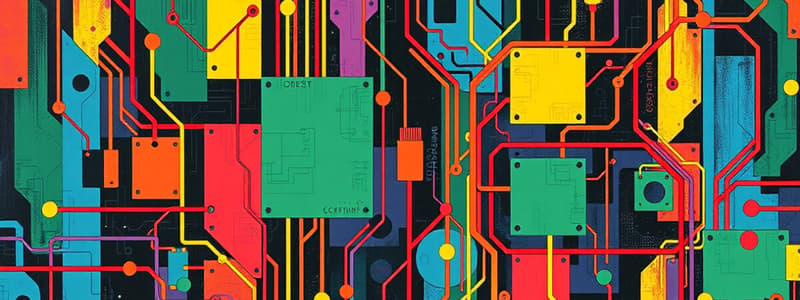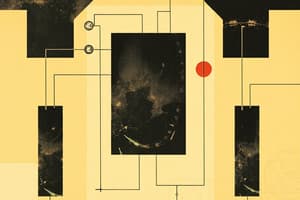Podcast
Questions and Answers
Which logic operation produces a true output only when all inputs are true?
Which logic operation produces a true output only when all inputs are true?
- AND (correct)
- NOR
- NAND
- OR
What is the purpose of a multiplexer in digital circuits?
What is the purpose of a multiplexer in digital circuits?
- To detect errors in data transmission
- To convert codes from one format to another
- To perform arithmetic operations
- To select one input from multiple inputs (correct)
Which of the following best describes a K-map?
Which of the following best describes a K-map?
- A type of digital logic family
- A system for binary arithmetic calculations
- A method for error detection in codes
- A graphical method for simplifying Boolean expressions (correct)
What characteristic distinguishes CMOS logic from TTL logic?
What characteristic distinguishes CMOS logic from TTL logic?
In binary arithmetic, what does the two's complement of a number represent?
In binary arithmetic, what does the two's complement of a number represent?
Which of the following logic gates produces an output that is false only if all inputs are true?
Which of the following logic gates produces an output that is false only if all inputs are true?
What is the primary function of a decoder in a digital circuit?
What is the primary function of a decoder in a digital circuit?
Which method is used for simplifying Boolean functions using a visual representation?
Which method is used for simplifying Boolean functions using a visual representation?
How does a carry look-ahead adder improve upon a standard binary adder?
How does a carry look-ahead adder improve upon a standard binary adder?
What is the main characteristic of tri-state logic in digital systems?
What is the main characteristic of tri-state logic in digital systems?
Study Notes
Fundamentals of Digital Systems
- Digital signals represent data in binary (0 and 1) form, essential in digital electronics.
- Key logic gates: AND, OR, NOT, NAND, NOR, and Exclusive-OR perform fundamental logical operations.
- Boolean algebra is the mathematical framework for analyzing and simplifying digital circuits.
Integrated Circuits and Number Systems
- Integrated Circuit (IC) gates are physical implementations of logical operations.
- Number systems: Binary (base 2), Signed binary (includes positive and negative), Octal (base 8), Hexadecimal (base 16).
- Binary arithmetic includes addition, subtraction, and employs one’s and two’s complements for signed numbers.
Error Detection and Correction
- Codes are mechanisms to represent data, including error detecting and correcting codes to ensure data integrity.
Characteristics of Digital ICs
- Digital Integrated Circuits (ICs) have distinct characteristics affecting their performance.
- Logic families include TTL (Transistor-Transistor Logic), Schottky TTL, and CMOS (Complementary Metal-Oxide-Semiconductor).
- Interfacing between CMOS and TTL logic families is critical for compatibility in digital designs.
- Tri-state logic allows for more than two states, enabling multiple outputs on a single line.
Combinational Digital Circuits
- Standard representation for logic functions assists in visualizing complex operations.
- K-map (Karnaugh map) is a tool for simplifying logic functions through graphical representation.
- Minimization of logical functions reduces complexity and resource usage in digital circuits.
- Don't care conditions provide flexibility in simplification and design of logical expressions.
Combinational Components
- Multiplexers (MUX) select data from multiple inputs to produce a single output.
- De-Multiplexers and Decoders also manage signal distribution based on logic levels.
- Adders and Subtractors perform arithmetic operations, with BCD (Binary-Coded Decimal) arithmetic used for decimal operations.
- Carry look-ahead adders enhance addition speed by predicting carry bits ahead of time.
- Serial adders process one bit at a time, contrasting with parallel operations.
Advanced Digital Design
- ALU (Arithmetic Logic Unit) performs arithmetic and logical operations in a CPU.
- Elementary ALU design is crucial for effective processing in digital systems.
- Popular MSI (Medium Scale Integration) chips include functional blocks like comparators and parity checkers/generators.
- Code converters and priority encoders translate and prioritize input signals for effective operation.
- Decoders and drivers interface with display devices, converting data for visual output.
Function Realization
- QM (Quine-McCluskey) method is a systematic approach for function realization and optimization in digital logic design.
Fundamentals of Digital Systems
- Digital signals represent data in binary (0 and 1) form, essential in digital electronics.
- Key logic gates: AND, OR, NOT, NAND, NOR, and Exclusive-OR perform fundamental logical operations.
- Boolean algebra is the mathematical framework for analyzing and simplifying digital circuits.
Integrated Circuits and Number Systems
- Integrated Circuit (IC) gates are physical implementations of logical operations.
- Number systems: Binary (base 2), Signed binary (includes positive and negative), Octal (base 8), Hexadecimal (base 16).
- Binary arithmetic includes addition, subtraction, and employs one’s and two’s complements for signed numbers.
Error Detection and Correction
- Codes are mechanisms to represent data, including error detecting and correcting codes to ensure data integrity.
Characteristics of Digital ICs
- Digital Integrated Circuits (ICs) have distinct characteristics affecting their performance.
- Logic families include TTL (Transistor-Transistor Logic), Schottky TTL, and CMOS (Complementary Metal-Oxide-Semiconductor).
- Interfacing between CMOS and TTL logic families is critical for compatibility in digital designs.
- Tri-state logic allows for more than two states, enabling multiple outputs on a single line.
Combinational Digital Circuits
- Standard representation for logic functions assists in visualizing complex operations.
- K-map (Karnaugh map) is a tool for simplifying logic functions through graphical representation.
- Minimization of logical functions reduces complexity and resource usage in digital circuits.
- Don't care conditions provide flexibility in simplification and design of logical expressions.
Combinational Components
- Multiplexers (MUX) select data from multiple inputs to produce a single output.
- De-Multiplexers and Decoders also manage signal distribution based on logic levels.
- Adders and Subtractors perform arithmetic operations, with BCD (Binary-Coded Decimal) arithmetic used for decimal operations.
- Carry look-ahead adders enhance addition speed by predicting carry bits ahead of time.
- Serial adders process one bit at a time, contrasting with parallel operations.
Advanced Digital Design
- ALU (Arithmetic Logic Unit) performs arithmetic and logical operations in a CPU.
- Elementary ALU design is crucial for effective processing in digital systems.
- Popular MSI (Medium Scale Integration) chips include functional blocks like comparators and parity checkers/generators.
- Code converters and priority encoders translate and prioritize input signals for effective operation.
- Decoders and drivers interface with display devices, converting data for visual output.
Function Realization
- QM (Quine-McCluskey) method is a systematic approach for function realization and optimization in digital logic design.
Studying That Suits You
Use AI to generate personalized quizzes and flashcards to suit your learning preferences.
Description
Test your knowledge on the fundamentals of digital systems, including digital signals, logic gates, and Boolean algebra. This quiz also covers integrated circuits, number systems, and error detection techniques used in digital electronics.




